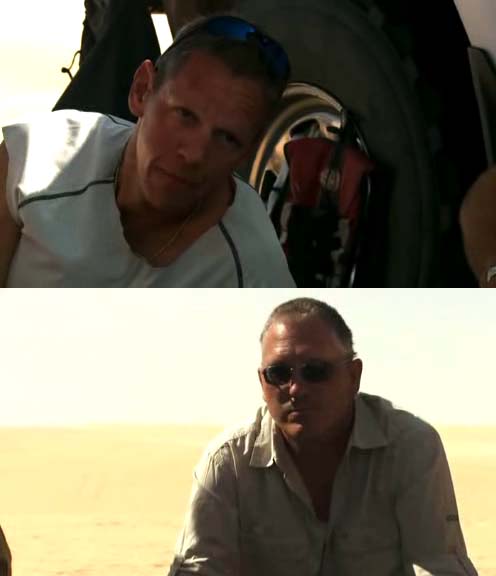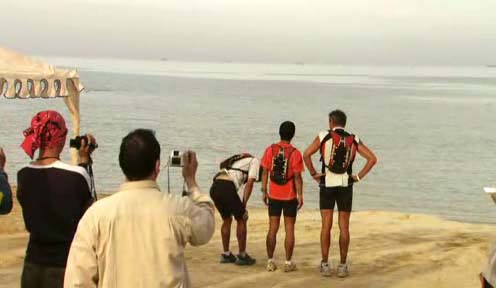And another sad example of the vanity documentary sub-genre.xxxxxxxxxxxxxxxxxxxxxxxxxxxxxxxxxxxxxxxxxxxxxxxxxxxxxxxxxxxxxxxxxxxxxxxxxxxxxxxxxxxxxxxxxxxxxxxxxxxxxxxxxxxxxxxxxxxxxxxxxxxxxxxxxxxxxxxxxxxxxxxxxxxxxxxxxxxxxxxxxxxxxxxxxxxxxxxxxxxxxxxxxxxxxxxxxxxxxxxxxxxxxxxxxxxxxxxxxxxxxxxxxxxxxxxxxxxxxxxxxxxxxxxxxxxxxxxxxxxxxxxxxxxxxxxxxxxxxxxxxxxxxxxxxxxxxxxxxxxx
It seems doubtful whether all but a handful of die-hard documentary researchers or bored Netflix queue-fillers would ever find this film were it not for the fact that Matt Damon is attached to it (he does sporadic voice-over for the film). The fact is, even before sitting down to watch this film, there are strong indications that it won't amount to much: the idea of someone running across the Sahara simply seems patently absurd. This isn't like a climb of Everest or a mission to the depths of the ocean; rather it is a nonsensical mission to run across the hottest, most inhospitable place on earth with little potential for elevating the human condition through its accomplishment, since, to be honest, who really cares if they make it. Primarily, the reasoning to watch this film will undoubtedly either have to do with the absurdity of its premise and the pure entertainment value in seeing something so ridiculous unfold; or, with the generosity of spirit to see whether or not the immeasurable difficulty in running the Sahara might just reveal some under-explored dimension of human spirit a cynical film-viewer might have overlooked from the comfort of his living-room. Unfortunately, on both counts, this film is a complete letdown and only ends-up exposing itself as just one more in an increasingly long list of wealthy tech millionaire's contrived misadventures. However, as with other such embarrassments as Dinosaur 13 or Tim's Vermeer, the actual way in which the debacle unfolds it does happen to expose an under-explored dimension of humanity: in this case, its pettiness.

Somewhere maybe midway into the film after seeing countless distant shots of our intrepid runners running along the crest of what appears to be the same sand-dune, one of the three participants (the distance runner from Korea, Kevin Lin), predictably (since what would such an endurance test be without a proper drama) begins to rethink his commitment to the run. Partly, this is entirely understandable. In this case, however, it surprisingly turns-out to have nothing to do with a drama around the struggle with the heat and physical stamina of running everyday in the desert, but with a kind of social drama with his other two running-mates (the leader and man who commissioned the film, Charlie Engle, and his friend who apparently has never run long distance in his life prior to setting off across he width of Africa, Ray Zahab). These two, in every scene we see them, have what seems to be the longest running shit-talking conversation ever produced by two people and recorded on film. Constantly debasing whatever it is they encounter, these two uber-Americans are sure not to spoil any single moment with their stupid commentary and with what they think are jokes, but are just typical little entitled sarcastic American jabs. And after a month of this, it seems the Korean wisely realized this endeavor held little genuine value for him in accomplishing, as it seems to be little more than a casual form of amusement for his two colleagues to denigrate everything and everyone they pass, including themselves.
But, when Kevin informs his team mates about his desire to leave, rather than try to understand the reasons for his change of heart and convince him to stay, Charlie sits down for a one-to-one with the camera to outline all the reasons why his leaving is a letdown for his project. His response is basically: 'I don't want anyone running who doesn't want to be here and if you think of leaving I am going to shame you eternally for your decision'. This is also the same response he gives the lead of the camera crew responsible for making the film when he too needs to leave the project; or when another member of the team leaves to Cairo for two weeks longer than he should have to take a break from the 'strict disciplinarian' of the team leader (since at this point the crews real motivations for things cannot be suppressed but spill-out everywhere in the film): 'leave if you think you aren't committed heart and soul to my project, I don't want to run with you and have you contaminating the rarefied air of my accomplishment with your demotivation'. It is as if, through the force of his will, and the shaming and social stigma he can bring with the money he has, that Charlie thinks he can make the accomplishment significant despite that all those around him have, one after the other, realized that it simply isn't.

It is in this sense that Running the Sahara is a testament to the boundless arrogance and limited emotional and spiritual depth of those with enough money to transpose themselves into another (adventurous) life: in this case, to assemble a film crew and spend a year running across the desert. Certainly, from the vast pantheon of incredible accomplishments already filmed, this lowly millionaire knows precisely how an accomplishment should look and how it should be presented: he knows full-well that such things are permeated with the electricity of anticipation of accomplishing something significant and that, should his film not contain the same, his accomplishment is sure to be diminished in the eyes of the viewer. So, his response to anyone wanting to abandon the project is, rather than question the project itself or his own role in helping make it such and such a way is to turn this 'logic of human accomplishment' into an imprisoning commandment and foreboding to all who would consider undermining it. A real dick move, in American parlance.
In short, watching this 'documentary' has basically nothing at all to do with the struggle to get across the desert and everything to do with a soulless millionaire's vanity project gone terribly wrong. Yes, there is something to learn about the nature of human-being here, but it isn't anything noble, only the most petty. And none of this even includes the absolute cringe-worthy debacle surrounding the pouting cry-baby passive-aggressive Charlie when he ditches his running-mates to try to run the final stretch alone, when he is supposed to be waiting so they can finish together (which he lies about having done). It is an unbelievable form of dishonesty, emotional blackmail, social manipulation and denigration of others with which to end the film. A really sad finale that culminates in a coerced performance of togetherness in this (ch/p)arade to the beach. But, really, those cheering arms and back-slaps are just saying: 'Thank God I'm done with Charlie. Hope he doesn't find some way to screw me over somewhere in the future with all his time and money. (Have I appeared satisfied with 'our' achievement for long-enough, Charlie? Can I go home now, please, Charlie?)'

